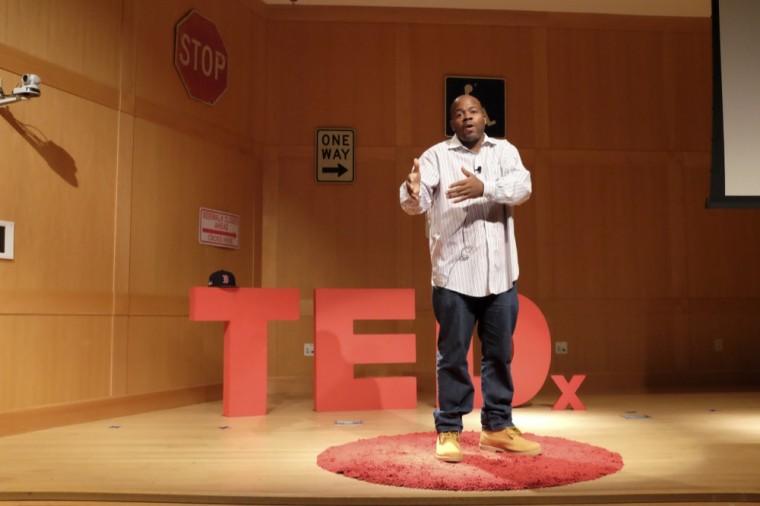News
TEDxWUSTL brings broad range of speakers to sold-out crowd
Sex, music and economic disenfranchisement were among the topics addressed at TEDxWUSTL’s 2015 event: “Crossroads.”
The Wednesday-evening program, which consisted of seven speeches and one video over the course of two hours, sold out its capacity of 200 tickets in just over an hour, while any other interested students were encouraged to show up for the event in the hope that not every ticket holder would arrive.
 Holly Ravazzolo | Student Life
Holly Ravazzolo | Student Life Andre Norman speaks at this year’s TEDxWUSTL conference featuring several students and professors talking about issues close to them.
TEDx offered Washington University students the opportunity to hear from experts about important issues that are rarely discussed in the classroom setting.
Many students explained they had watched many TED talk videos online and were excited to see the largely virtual medium in person.
“A lot of things learned in college aren’t application-heavy, so it’s great to hear of things you can capitalize on outside of class,” sophomore Reuben Hogan said.
“TED is so cool…it’s a source of inspiration,” senior Vincent Ann said. “It’s a great way to bring students and faculty together to hear some amazing speakers.”
Susan Stiritz, a senior lecturer in the Brown School of Social Work, lead off the talks giving her lecture titled “Hickies and Humping: Why Sex is Good for Teens.” An attack at the abstinence-only, sex-taboo culture of American society, Stiritz’s lecture resonated with the college-aged audience as snaps and laughs echoed throughout the lecture hall.
Alumnus Brendan Lind, executive director and co-founder of the non-profit LaunchCode, followed Stiritz with a speech disparaging the lack of opportunities given to those without access to higher education.
“In the United States, the biggest influence on getting a job is who you know, a direct connection or a college degree,” Lind said.
He was followed by Jenny Murphy, an Austin, Texas native, who spoke on the benefits of “creative reuse” and how to build “connected, engaged, and sustainable” communities.
Washington University associate chair of psychology Jeffrey Zacks wrapped up the first half of the program with a discussion on how our brains translate visual input and how that relates to the media we consume.
After a brief break, juniors Rohan Khazanchi and Julia Winemiller, spoke against the professionalization of music, punctuating their talk with an audience-involving performance by the student group Crash.
The event concluded with presentations by Andre Norman, a former inmate speaking against the indifference of the American population towards the prison community, and Joshua Jackson, assistant professor of psychology, detailing his research on how our personalities can predict our death dates.
Senior Nicole Joison, who was a fan of the event, said that TED is “an awesome way to share info in an engaging and active way” and that it “inspires people to learn for the sake of learning.”
Sophomore Eddie Campell also left Whitaker Hall satisfied.
“You go to a TED event expecting to hear these big, grand ideas,” Campell said, “And it still took me aback.”
